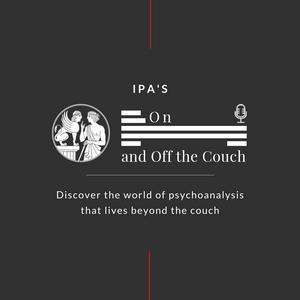From Reacting to Reflecting: "How Psychoanalysis Made Us Better Surgeons" with Mauro Vasella, MD and Flavio Vasella, MD, PhD (Zurich)
"I have had quite some reactions to the article [on their psychoanalyses]. I was also telling Mauro and my colleagues that out of quite a number of articles I've published on maybe more pressing issues in the field of cancer research, for example, brain tumor research that I've spent quite some time with, I think it's actually the article [on psychoanalysis] that probably prompted the most reactions, at least in my personal surroundings, and the reactions have been overwhelmingly positive. So colleagues are very interested. They often ask questions about psychoanalysis, quite specifically, how it works, how it contributed, and also complemented the article in the sense that it was something that was quite outside of the box, so outside of the typical surgical publication.” - FV "How can we reach surgeons? How can we make this interesting and attractive for them to even consider? I think most surgeons will be very performance-driven people, and I think that it goes hand in hand that that type of person will seek ways to improve themselves, but probably more in a technical way. Let's say they want to get faster in their operations. They want to get more skillful. They want to do more complicated surgeries. So there's a lot about self improvement in that you exercise until you master something. And I think that analogy with sports was our way of saying, hey, you know, this is actually pretty cool. You can compare yourself to professional athletes, in terms of self improvement, and this is actually one way you can get there, how you can improve. At the same time, it was also important for us to acknowledge that it's not for everyone so we also mentioned alternatives, of course." - MV Episode Description: Mauro and Flavio begin by describing the encouragement they received from their father to pursue personal analysis "to explore our unconscious minds for a lighter life and less emotional baggage." They share their psychoanalytic journeys and give examples of how their greater capacity to reflect instead of react has led to improved surgical patient outcomes. They also describe collegial tensions that were more clearly addressed through their ability to authentically know how they felt. They recommend that like elite athletes who have sports psychologists to address obstacles to their performances, so might surgeons appreciate the utility of psychoanalysis and other measures to improve their clinical attunement. Mauro concludes "Everyone has their baggage - don't be afraid to look at it and to understand what's going on. It's worth it." Our Guests: Flavio Vasella, MD PhD, is a junior attending neurosurgeon at the University Hospital Zurich, with a clinical and research focus on neurosurgical oncology. He earned his PhD in Molecular Life Sciences at the University of Zurich, where his research explored genome editing strategies in primary brain tumors. His primary academic interests include translational and clinical neuro-oncology as well as surgical education. Mauro Vasella, MD, is a board-certified plastic surgeon with multiple years of clinical experience specializing in reconstructive surgery. He is affiliated with the University Hospital Zurich in Switzerland and the Royal Melbourne Hospital in Australia and has held positions as a fellow and attending surgeon. His practice and research field focuses on regenerative-reconstructive surgery and burn injuries. Recommended Readings: FV - Paul Kalanithi – When Breath Becomes Air This memoir by a neurosurgeon-turned-patient is a poetic and piercing meditation on mortality, identity, and the transition from doctor to patient. It explores the tension between the analytical and emotional mind (somewhat paralleling the internal work of psychoanalysis) and offers profound insight into the humanity at the core of medical practice. Bill George – True North: Discover Your Authentic Leadership This book presents a leadership philosophy rooted in self-inquiry, values, and life stories. True North emphasizes that effective leadership comes from understanding your life narrative and using that insight to lead with integrity and resilience. True North challenges leaders to cultivate authenticity by exploring their internal landscape. While the book focuses on leadership in a business context, it offers a compelling, practical perspective for medical professionals as well. Atul Gawande – Complications: A Surgeon’s Notes on an Imperfect Science Gawande offers a candid look at the uncertainties, dilemmas, and emotional burdens of being a surgeon. His reflection on fallibility and decision-making underlines the importance of non-technical skills and the internal work required to become not just competent, but humanely attuned, in medicine. The impact of nontechnical skills on technical performance in surgery: a systematic review. Hull L, Arora S, Aggarwal R, Darzi A, Vincent C, Sevdalis N. J Am Coll Surg.2012 This systematic review analyzed 28 studies linking surgeons’ non-technical skills—such as teamwork, situational awareness, and stress management to actual technical performance in the operating room. It found evidence that effective NTS positively affects outcomes, while fatigue and communication failures contribute to technical errors. MV - The Art of Loving – Erich Fromm Realizing the simple but somehow not always obvious fact that before being able to truly love someone, one must truly find themselves loveworthy. This implies and demands introspection, as well as forgiveness towards yourself and others. Outliers: The Story of Success – Malcolm Gladwell To master something, one must invest a substantial amount of time and dedication – this is not only true for technical skills, but also non-technical skills. Personal growth is only possible if you invest time, such as undergoing a psychoanalysis or similar. The Checklist Manifesto – Atul Gawande While the checklist itself is very technical, the way it was conceived and its effect was and still is rather non-technical. It is a question of putting your ego aside and truly focusing on areas which you can improve.



